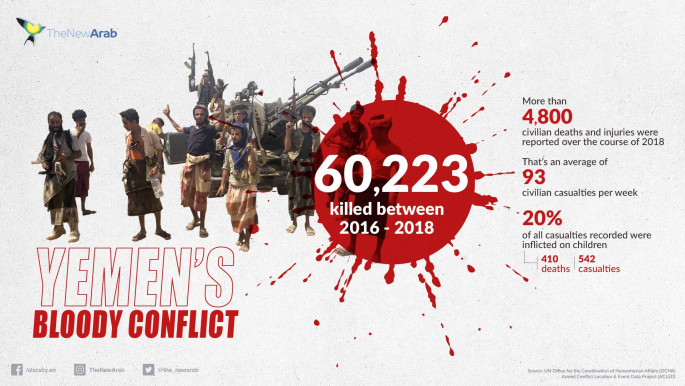Four years of war: Yemen's devastating humanitarian crisis
The war between the Houthis and pro-government troops escalated four years ago in March 2015, when a Saudi-led military coalition intervened against the rebels.
Civilians on front line
More than 10,000 people - mostly civilians - have been killed since the Saudi-led coalition joined the conflict, according to the World Health Organisation (WHO).
But the exact numbers are not known and aid groups warn the toll is likely to be at least five times higher, with Action Against Hunger putting it at more than 57,000.
On March 18, 2019, the Norwegian Refugee Council said that civilian casualties have risen in Yemen despite a three-month-old truce in the vital aid port of Hodeida.
According to French aid group Action Contre la Faim, 3.3 million people have been displaced within Yemen.
The country has also been ravaged by cholera, which has killed more than 2,500 people since April 2017. Around 1.2 million suspected cases have been reported, according to the WHO.
'Hell on earth' for children
The UN children's fund (UNICEF) has regularly pointed to the devastating effects of the conflict on children.
"It is a living hell for every boy and girl in Yemen," it said in November 2018.
It said 1.8 million aged less than five are suffering from acute malnutrition.
Save the Children said that between April 2015 and October 2018 some 85,000 children may have died of severe malnutrition or related diseases. Others have been killed by combat.
Lost generation
According to the UN, two million of the country's seven million children of school age go without education in Yemen.
More than 2,500 schools are out of use, of which two thirds have been damaged in attacks, 27 percent closed and seven percent used by the military or as shelters for displaced people.
Largely due to their families' poverty, two out of five girls are married before the age of 15 and three quarters before 18, according to UNICEF.
Thousands of boys have been recruited as child soldiers.
'Worst humanitarian crisis'
In March 2017, Stephen O'Brien, the UN's under-secretary general for humanitarian affairs, said Yemen was the scene of "the largest humanitarian crisis in the world".
The United Nations warned in February 2019 the situation was getting even worse.
"An estimated 80 percent of the population - 24 million - require some form of humanitarian or protection assistance, including 14.3 million who are in acute need," the UN Office for the Coordination of Humanitarian Affairs said.
The number of people in acute need is "a staggering 27 percent higher than last year", it said, adding two-thirds of the country was "already pre-famine".
According to Action Contre la Faim 16 million people lack access to water and sanitation and basic health care. Meanwhile, half of Yemen's clinics are closed and more than 70 percent do not have a regular supply of medicines.
War crimes
In March 2018, rights group Amnesty International accused Western countries of supplying arms to Riyadh and its allies, who could stand guilty of war crimes in Yemen.
Last August a UN expert mission concluded that all warring parties had potentially committed "war crimes".
As Yemen's population mark the forth year of the devastating war, efforts to bring peace have so far failed to yield results.
In December, the rival sides agreed to a ceasefire in the key lifeline Red Sea port of Hodeida - just weeks after forces loyal to the government were able to enter the rebel-held city.
But even if major fighting has stopped, other elements of the accord - including a prisoner swap - have failed to materialise.
Agencies contributed to this report.
Follow us on Twitter: @The_NewArab





 Follow the Middle East's top stories in English at The New Arab on Google News
Follow the Middle East's top stories in English at The New Arab on Google News


